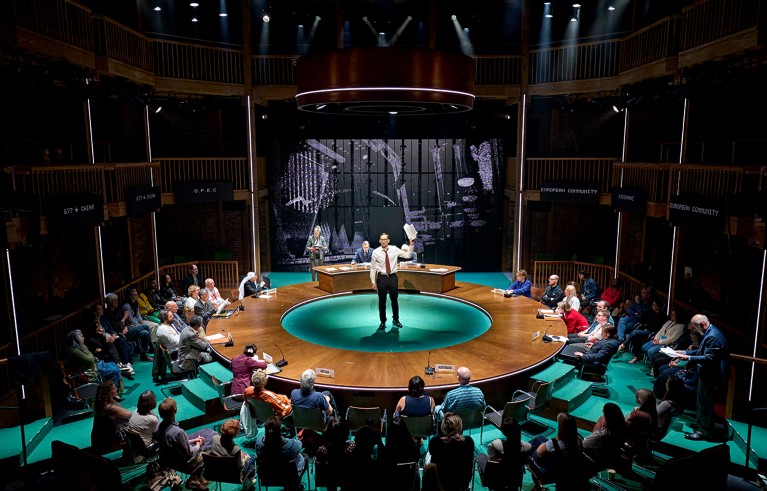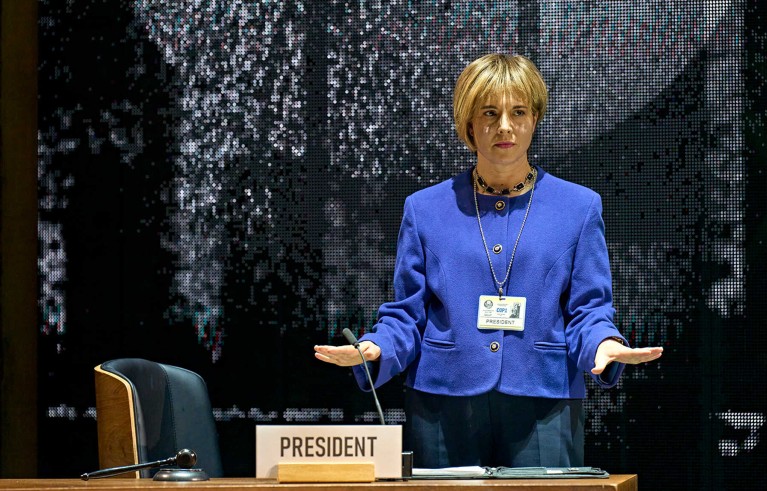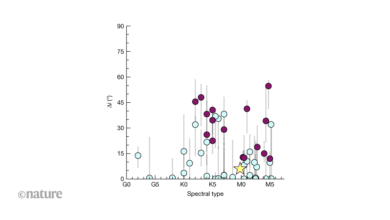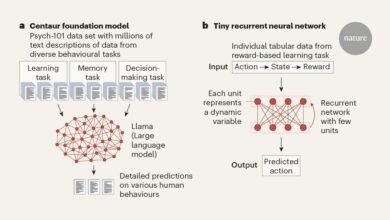
Kyoto Dir . Stephen Daldry and Justin Martin Swan Theatre, Stratford-upon-Avon, UK 18 June to 13 Jul 2024
Climate change poses a wicked problem to humanity. We are all complicit, at least in part, in an ongoing devastation that threatens everyone, but for whom the least well-off are also the most vulnerable. The warnings of climate scientists have been ignored for much too long. Something in the telling needs to change.
A play, Kyoto — which had its world premiere last month at the Royal Shakespeare Company’s Swan Theatre in Stratford-upon-Avon, UK — attempts to cast a fresh light on climate narratives by focusing on the negotiations of the Kyoto Protocol. This international treaty, signed on 11 December 1997 in Kyoto, Japan, was the first to commit countries to reduce their greenhouse-gas emissions to mitigate climate change.
These momentous events, as recounted in Joe Murphy and Joe Robertson’s gripping drama, are set in the round, with actors joined by audience members surrounding a circular wooden conference table. It all adds up to a fabulously engaging evening of theatre.
In the shoes of the opposition
Making a fossil-fuel lobbyist and supporting lawyer, Don Pearlman (brilliantly played by Stephen Kunken), the narrator and protagonist of the play is a master stroke. Showing us the unfolding events through his eyes avoids the preachiness that often besets accounts of environmental degradation. Doing it this way — nuanced, complicated and human — and interrogating the difficult nature of achieving a consensus feels like the fresh approach needed.
Early in the play, climate scientist Ben Santer (played by Dale Ripley) explains to Pearlman how changes in atmospheric temperatures are a distinctive fingerprint of human activities. Santer’s findings, later published in Nature (B. D. Santer Nature 382, 39–46; 1996), gave rise to the landmark statement by the Intergovernmental Panel on Climate Change (IPCC) that there was a “discernible human influence on global climate”.

The audience surrounded the stage, making for an immersive experience.Credit: Manuel Harlan/Royal Shakespeare Company
Despite vicious backlash from climate-change deniers, such as atmospheric physicist Fred Singer (another key character played by Vincent Franklin), this scientific evidence eventually forced governments to take action to reduce emissions at the highly charged Kyoto summit.
Haggling over the intricacies of language, a process in which a single word can be argued over for hours and a misplaced comma can lead to diplomatic disaster, might seem a rather dry subject for an audience not immersed in the nuances of climate science and policy as much as I am. But judging by the rapt attention of the audience, engaged interval chatter and rapturous final applause, that is far from the case. Such deftly handled material cuts through to the heart. And that, given the pressing need for collective action on climate, including by our politicians, is immensely heartening.
Reaching the summit
As a junior climate researcher, I attended the 1997 Kyoto summit alongside another colleague at the Met Office Hadley Centre in Exeter, UK. There were very few scientists there back then, and our job was to explain to delegates our predictions of rising temperatures, inundated coastlines and damaged crops from a table in the lobby just outside the main congress chamber.
I also presented the latest evidence, hot off the press, that climate had already changed as a result of human-made emissions. It was just that evidence that the real Singer, when he confronted me at our lobby table, was so keen to denounce. And it was just that evidence that was the core reason delegates kept going, forgoing sleep hour after hour, beyond the closed doors a few steps away from our table. Only curbing emissions would protect planetary health, even if curbing those emissions would also threaten the economic status quo.

German representative Angela Merkel (played by Ingrid Oliver).Credit: Manuel Harlan/Royal Shakespeare Company
The denouement was as thrilling in Kyoto the play as it was in Kyoto the city. I remember well the fevered activity in the lobbies, and UK minister and negotiator John Prescott (portrayed in knockabout style by Ferdy Roberts) failing to make it to our table three times because he kept being waylaid by frantic delegates. In the theatre, I particularly enjoyed the moment when the interpreters have gone home and total mayhem ensues as delegates exchange punctuation marks in multiple languages, ever more raucously and hilariously.
Life imitates art
Most thrillingly of all, Kyoto feels as relevant today as the summit did in 1997. In the 27 years since, many similar dramas have played out behind the scenes of other climate meetings. In searching, as Santer did, for detectable effects of human-induced emissions, climate scientists such as myself have uncovered a galloping rise in the frequency of damaging heatwaves, floods and droughts.
The IPCC reports that I’ve worked on have involved the same sorts of tortuous negotiation over words so vividly described in Murphy and Robertson’s drama. I have seen how oil-industry-funded climate deniers continue to operate, shifting their approach from denying global warming to attacking the necessity of reducing emissions fast enough to avoid catastrophic consequences that no society, no matter how well adapted, could possibly survive untraumatized.
At times I have felt despair at the lack of political will to tackle climate change. At others, I have felt encouraged that the transition towards a more sustainable future is already under way. Whatever state we’re in now, as Kyoto so entertainingly demonstrates, there is no substitute for continuing to put in the work to protect the planet that is our only home. Fighting for agreement across entrenched divides is the only way, just as those exhausted, sleep-deprived delegates showed, all those years ago in Japan’s old imperial capital.
Competing Interests
The author declares no competing interests.
Source link







